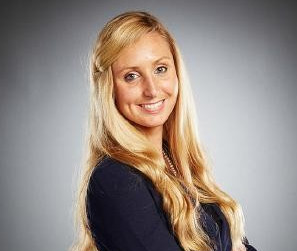My whole life growing up I was fortunate to have been healthy, never really having to worry about my body or physical health. My mindset all the way through most of my 20s was one of “the brain leads, and the body has to follow.” This mindset was unexpectedly turned upside down right after getting married. After about six months of newlywed bliss, my husband, T.J., and I would quickly discover what it would mean to be there for each other “in sickness” — both as patients and as caretakers. We learned a lot along the way and we want to share our story to help others who may be going through difficult times, or are working to listen to their body, or maybe just want to pick up a few practices to help build healthier habits for mind, body, and soul.
After experiencing multiple collapsed lungs in my late 20s, I was finally diagnosed with a severe case of endometriosis. The lesions had spread to my diaphragm, causing my right lung to collapse. It had also spread to my colon causing severe obstructions. Ultimately, I was in and out of the hospital for more than two years and had a total of six major surgeries during that period, including pleurodesis on my right lung, a colostomy, an ileostomy, and finally a full hysterectomy. The scariest moment was, shortly before my 30th birthday, when I went septic due to complications from one of the surgeries. I was brought into emergency surgery in the middle of the night. When I woke up in I.C.U., I had a colostomy placed, could not get out of bed for days, and ended up being in the hospital for three weeks fed by packs of I.V. only. I clearly remember a day during this time lying in the hospital bed (my husband and I still refer to it as my dark day), where I was so frustrated and disappointed by my body letting me down. I also thought that I would not be able to function in normal daily activities like working my corporate job, exercising, or traveling with tubes coming out of me to keep me alive.
I will never forget this day, as it was the next day after that was a turning point for me. I knew I had a choice to make — feel sorry for myself and be miserable, or reframe and change my mindset. I worked to put a few things in place physically, mentally, and emotionally that helped me get through this time and these are still practices I follow years later. For one, I used reframing to think about how amazing and resilient the human body is (vs. being angry at my body). I started practicing mindfulness and focusing on my breathing — something I was never aware of before. I started walking and increasing the number of steps I took each day to build strength and stamina. And lastly, I focused on the strong relationships and connections in my life. I am so blessed with the most supportive husband who was there for me day and night, all while he is also trying to keep our household running, building up his company, and going to graduate school. My family had a huge impact as well; my mom came and slept on a pullout bed in my hospital room for multiple weeks, my dad flew across the country to see me for 24 hours, my brother who is a culinary chef came by once I was released from the hospital and cooked meals that fit the restrictive dietary plans I was on. In addition, extended family, in-laws, friends, and colleagues all were there when we needed them most. I learned that life has a way of carrying on, and it is up to your own mindset on how you react and cope in light of adversity. Perspective, resiliency, and having strong trusted relationships are key.
After a few months and getting better, I started a new job, which was a major career move that led to T.J. and I moving to Northwest Arkansas, where we bought our first house. I went on a safari to Africa with my mom, and I had a lifelong dream come true by buying a horse. During this time, we had a wonderful six-month window of bliss, until health concerns started to creep back into our life… This time, though, it was my husband, T.J. He was diagnosed 20+ years ago with IgA Nephropathy and was told that it would disappear over time. Unfortunately, that was not the case, and his health quickly deteriorated into end-stage renal failure, which means 15% kidney function or less. For more than a year his kidney function continued to decline, and he was getting weaker and weaker, eventually ending up on dialysis and the transplant list. I suddenly found myself switching roles from the patient I had been in prior years to now being the caretaker, all while also juggling my corporate job and running our household without any family close by. In all honesty, the caretaker role at times seemed even more overwhelming and daunting to me than being the patient.
Through a stroke of luck we found out a few months ago that I was a kidney transplant match for T.J., and after travel restrictions from the COVID-19 pandemic were lifted we were going to go to the Mayo Clinic and get the transplant surgery scheduled. Luckily, I had learned a thing or two from my past surgical experiences and knew it was important to get plenty of sleep, keep the body moving, eat healthy, and focus on the positive in our lives especially as we prepared for this major milestone of a transplant. I am happy to report the transplant surgery was successful for both T.J. as the kidney recipient and myself as the donor. As I am now sitting here in my hotel room in Rochester, MN looking at the Mayo Clinic, I am overwhelmed with the feeling of gratitude. Grateful for the family, friends and colleagues in our lives who have helped us through all this, grateful for the healthcare professionals who saved our lives, grateful for the life lessons this journey has taught us. My husband and I are both recovering well and getting stronger each day, anxiously awaiting to return to Northwest Arkansas and start the next chapter in which we can hopefully focus on the “in health” part of our marriage.
Some of the key lessons the past few years have taught me have had a profound impact not only on my personal life, but also on my outlook as an H.R. professional.
Lessons from a personal side
1. Perspective is everything. Things happen in life that are out of our control, but what we can always control is how we react to them and our mindset. What has helped in the darkest days is looking at the positive and finding a sense of gratitude, even if it was only for the smallest things (a nice text from a friend, a favorite song playing on the radio, being able to get out of bed and walk). Be thankful everyday for what you have and focus on what is in your control.
2. You are more resilient than you think. The human mind and body are amazing and can get through so much. We adapt to our surroundings and can bounce back from setbacks. In this, I have learned that listening to your body and creating sustainable healthy behaviors to take care of yourself is essential. The whole “put your mask on first before assisting others” that we all have heard hundreds of times on planes is sound advice. When you are the caretaker, you need to remember to take care of yourself first; get enough sleep, eat and exercise properly, and also meet up with family and friends to support you and spare a listening ear. I know it sounds odd to leave a loved one at home or at the hospital to take a nap or have dinner with a friend, but sometimes you need that time so you can be your best self to take care of your loved one, and be the best version of yourself that they deserve.
3. Relationships are key. We are extremely grateful for a strong support system of family and friends that were there for us in the good and difficult times. The biggest thing I learned here is that open communication, showing vulnerability, and nurturing connections make all the difference. The same goes for marriage — as a couple who has been married for just over five years and spent the majority of those years working through critical medical conditions, T.J. and I have learned how to be there for each other, and it has only made us stronger as teammates in life.
Lessons from an H.R. side
1. Don’t underestimate a good benefits plan. In 2020, Walmart, the company I work for, added kidney transplants to its Center of Excellence program, meaning that the entire procedure and access to some of the best medical care in the world are fully covered by our benefits. This world-class benefits program is one of the things I am most grateful for, as medical coverage and finances did not need to be additional stressors in an already very stressful medical crisis.
2. Promote and foster a healthy work culture. The tone a company sets around healthy behaviors can have a big impact on employee engagement and retention. There are many things a company can do to promote a safe work environment and the well-being of their employees. In today’s world this seems more important than ever. Key partnerships, listening to what is on employees’ minds, providing resources, and raising awareness can go a long way. For example, a partnership between Walmart and Thrive Global came at the right time and provided me with resources and support to build healthy habits leading up to the kidney transplant surgery and through recovery.
3. Leadership support matters. I have been very fortunate to have had multiple supportive leaders throughout the past five years of my health journey. Each has shown care and concern for me as an individual by checking in, asking questions, and allowing for the needed time off (even encouraging it!). Now I can only pay it forward and provide the same kind of support to the people I am privileged to work with.


